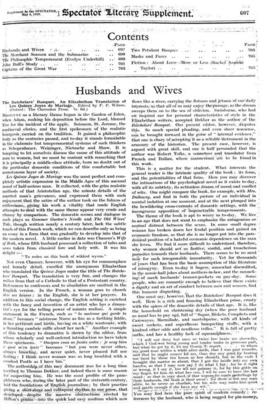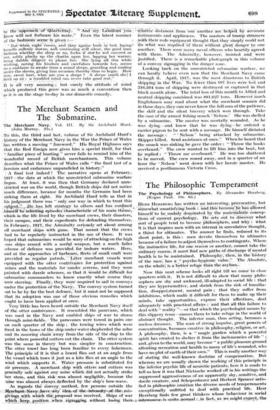Husbands and Wives The Batchelars' Banquet. An Elizabethan Translation of
Les Quinze "Joyes de •Mariage. • Edited by F. P. Wilson. (Oxford : The Clarendon Prom. 7s. 6d.) MISOGYNY as a literary theme -began in. the Garden of -Eden, when Adam, making his deposition before the Lord, blamed Eve for the incident of the apple. Solomon, St. -Jerome, the mediaeval clerics, and the .first spokesmen of the realistic bMirgeois _carried on the tradition. It. gained a philosophic bOdy as-the centuries passed, and to-day it stands formidable
in elaborate but temperamental systems of such thinkers as Schopenhauer, Weininger,. Nietzsche and Shaw. It is tempting to let ourselves discuss the cause of thii attitude of men to women, but we must be content with remarking that it is principally .a middle-class attitude, born no doubt out of the particular domestic conditions of this comfortable but monotonous layer of society.
Les Quinze Joyes de Mariage was the most perfect and com- pletely artistic expression in the Middle Ages of this asexual mood of half-serious man. It collected, with the grim realistic
methods of that Aristotelian age, the minute -details of such married man's grievances, and expressed them with such enjoyment, that. the satire of the author took on the fidness of enthusiasm,„gplag. his work .a vitality that made English attempts to•deal with the same theme appear very crude and chimsy by comparison. The domestic scenes and dialogue in such plays as Gammer Gurton's Needle and The Old Wives'
Tale, though written nearly a century later; lack the subtle touch of this French work, which we can describe only as being
an essay in a form that was gradually to develop into that of the modern novel. A little earlier in date was Chaucer's Wife of Bath, whose fifth husband possessed a collection of tales and saws taken frOm classical lore and . holy writ. It was his delight To reden on this book of wikked wyves."
Not even Chaucer,• however, with his eye for commonplace and hoinely detail, excelled the anonymous Elizabethan
who translated the Quinze Joyes under the title of The Bakke- bus' Banquet. The translation is very free, and changes the milieu from that of a Catholic to that of a Protestant country. References to confessors and to absolution are omitted in the English version. in the French, a woman goes to church dire sesiltitir es ; in the English, she is at her *prayers. In
addition:to this social change, the English setting is enriched with the fancy and invention of an artist 1•,•ho has a drama- tist's eye for the telling power of minute realisni. A simple
statement in the French, such as " la -niatrone qui garde la dame," becomes." mistresse Nurse as fine as a farthing fiddle, in her pettidcifit and kirtle, having on a white wastcoate, with a flaunting cambric ruffle about her neck." *Another example of this tendency to dramatize is shown by the. editor, from whose scholarly and well-ordered intMiniatiOn we have taken theie specimens. " Oiicques V0148 ne fuslesautre : je scay bien a quoi m'en (enir".. becomes " but you were never other, always brawling; and never quiet, never pleased full nor fasting : I think never woman was so long:troubled with a
crooked Postle as I have bin.". • The authoiship,of this racy. document_ was for a long time
asciribed, to Thmias Dekker, and indeed -there is some reason for: suspecting him. He was the most prolific of the .pam- phleteers who, diiiing the later part of the sixteenth century, laid the foundations of English journalism ; by their practice giving a ehirf-Sleeve rhzilmi.to our prose, that deii•eloped—despite the massive obstructions , erected by Miff oti's teniiii=ifitii the qitick and easy medium WhiCh now flows like a river, carrying the• flotsam and jetsam of our'daily interests:sp:that all of us may enjoy theF'asflage, as.the stream sweeps them on to the sea of oblivion.. Swinburne, who had an- inspired ear for personal characteristics of style in the Elizabethan -writers, accepted Dekker as the author_ of the B4Ichelars' Banquet. Our prCseat editor, however, dispuites this. So much special pleading, and even sheer nonsense, can. be brought forward in the guise of " internal evidence," that one is chary of accepting it as a- reliable instrument in the armoury of the historian. The present case, however, is • argued with great skill, and one is half persuaded that the author was -Hobert. Tofte, a sonneteer and translator from French and Italian, whoSe mannerism's 'sire: to fOund in
this work. •
This is a matter for the student. What interests the general reader is the intrinsic quality of the book ; its form, and the potentialities of that form. Here you may discover the intimations of the psychological novel as it exists to-day, with all its subtlety; its -acOonless -drama:of mood:and conflict of wits. One might compare the book, for example, with Mrs. Dalloway, and find in both the picture of an individual in mental isolation at one moment, and at the next plunged-into '• the bewildering cross-currents of domestic settings, with the incongruous apposition' Ortm'Penetrable temperaments.
The theme of the book is apt to weary us to-day. We live: in-in age that doe:s not -want to emphasize the antagonism or - mutual distrust between the sexes. In some small degree woman has broken down her feudal position and gained an
economic freedom, so that she is no longer put into the pant- „.
doxical position of a hateful economic dependence on the man •
she loves. We find it more difficult to understand, therefore, why women should act as furtive; sbrdid, and treacheibus parasites towards their husbands. There seems to be no need ' now, for such irresponsible immaturity. : Yet for thousands ' of years that has been the basic assumption of this literature of misogyny. Even to-day it lingers, somewhat discredited, in the music-hall jokes about mothers-in-law, and the ransack- ing. of meek husbands' trouser-pockets on pay-day. Some people, who are romantic enough to believe that there exists a dignity and an art of conduct between men and women, find
this humour disgtisting.
One must say, however, `hat the Bateheiars' Banquet does it well. Her is a rich, and foaming Elizabethan prose, crusty with the spices of the domestic details of that-age. . It is, like the. household on christening day (when the poor husband usual has to pay up)”, full of " Sugar, Biskets, Comphets and CaiPwayes, Marmilade, and martchpaine,• with• all kinds.'of ;sweet suckets, and superfluous banqueting stuffe, with a kindred other odde and needlesse trifles." It .is full of pretty !oaths, and has a healthy lack of squeamlihness " will not' deny but once or -twice hod' boats me shrewdly, ;which I God-wot being young and tender tooke in greevous part, but; what he got by it, lot my Gossip T: report, . . M whom Imy good man within a while after aaide, that I was past remedie, and that he might sooner kil. me, than doo any good, by, beating 'me 'land by these ten bones eo hee should), fait in the endo I brought the matter so about, that I got the bridle ihtd my own 'hander, so that I may now say..I do )vhat , for be it right or Wrong, if I say it, hae wet not gainsay it, for i)jr this gold° on my finger, let him do what hee can, I wil be sure to have the last !word : so that in very deed,...if that wojneetbe-medepanderlings by ;their husbands, thifiLlault is their owne for there' is-not any man
be he never so churlish, but his wife may make him quiet land gentle enough if she have any wit.".
• •,r-„r- • - cm*, • 14,.4 I You may find here the pure spirit of modern comedy ; re- ferences by the husband, who is being nagged for pin-money.
to OftifadaY.
inow will not forbeare his renter' Even the latest manner
Of the bedreibiii= scene-is- given - - - - " But•When night comes, and they egaine both in' bed, laying' lierselfe sullenly downe, anti continuing still silent, the good man harkens whether she sleep or no, feeler if she' be wel covered or hot, softly plucks up the cloatbs upon her, lapping her warme, being dubble diligent to please her. She lying all this while winking, noting his kindnes and carefulnes towards her, seems on a suddaine to awake from a sound sleepe, gruntling and unsling Linder the sheets, giving him occasion thereby thus to begin. How now, sweet hart, what are you a sleepe ? A sleepe (saith she) I Jaith no sir : a troubled mind can never take good rest."
.1t is all very amusing ; but surely the attitude of mind Which produced this genre was as much a convention then ' as it is on the stage to-day in our-domestic comedy.























































 Previous page
Previous page